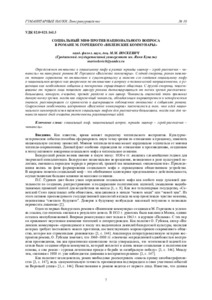Please use this identifier to cite or link to this item:
https://elib.psu.by/handle/123456789/22870Full metadata record
| DC Field | Value | Language |
|---|---|---|
| dc.contributor.author | Иоскевич, М. М. | - |
| dc.date.accessioned | 2018-11-28T11:24:14Z | - |
| dc.date.available | 2018-11-28T11:24:14Z | - |
| dc.date.issued | 2018 | - |
| dc.identifier.citation | Вестник Полоцкого государственного университета. Серия A, Гуманитарные науки. - 2018. - № 10 – C. 7-13. | ru_RU |
| dc.identifier.issn | 2070-1608 | - |
| dc.identifier.uri | https://elib.psu.by/handle/123456789/22870 | - |
| dc.description | Social Myth Versus National Issue in the Novel «Vilna Communards» By M. Harecki M. Ioskevich | ru_RU |
| dc.description.abstract | Определяется отношение к социальному мифу в рамках триады «автор – герой-рассказчик – читатель» на материале романа М. Горецкого «Виленские коммунары». С одной стороны, роман занимает позицию сервилизма по отношению к существующему в момент его создания социальному мифу о национальном вопросе как вторичном по отношению к вопросу о политической направленности, о революции как необходимом событии в построении справедливого общества. С другой стороны, повествование от первого лица позволяет автору романа дистанцироваться от точки зрения рассказчика-большевика, которую, очевидно, прежде разделял и сам автор. Читатель советской эпохи принимал данную точку зрения, тогда как современный читатель, обладая иным мировоззрением и историческим знанием, рассматривает ее критически и выстраивает собственное отношение к событиям романа. Современная особенность восприятия «Виленских коммунаров» заключается в том, что идея национального самоопределения является социальным мифом для рассказчика-большевика, тогда как для читателя наших дней очевидна утопичность революционных идей.= The aim of this article is to reveal the attitude to social myth within the triad «author – hero-narrator − reader» based on the novel «Vilna Communards» by M. Harecki. on the one hand, the novel takes the position of servility in relation to existing at the time of its creation social myth about the national issue as secondary to the issue of political orientation and the revolution as a necessary event in the construction of a just society. on the other hand, the first-person narrative allows the author of the novel to distance from the point of view of the Bolshevik-narrator, which, obviously, was previously shared by the author himself. The reader of the Soviet era embraced this point of view, while the modern reader, having a different outlook and historical knowledge, refers to it critically and forms his own attitude to the events of the novel. A modern feature of the perception of «Vilna Communards» lies in the fact that the idea of national self-determination is a social myth for the Bolshevik-narrator, while revolutionary ideas are utopian for the reader of our time. | ru_RU |
| dc.language.iso | ru | ru_RU |
| dc.publisher | Полоцкий государственный университет | ru_RU |
| dc.relation.ispartof | Веснік Полацкага дзяржаўнага ўніверсітэта. Серыя А, Гуманітарныя навук | be_BE |
| dc.relation.ispartof | Herald of Polotsk State University Series A, Humanity sciences | en_EN |
| dc.relation.ispartof | Вестник Полоцкого государственного университета. Серия A, Гуманитарные науки | ru_RU |
| dc.relation.ispartofseries | Серия A, Гуманитарные науки;2018. - № 10 | - |
| dc.rights | open access | ru_RU |
| dc.subject | Государственный рубрикатор НТИ - ВИНИТИ::ОБЩЕСТВЕННЫЕ НАУКИ::Литература. Литературоведение. Устное народное творчество | ru_RU |
| dc.subject | Социальный миф | ru_RU |
| dc.subject | Национальный вопрос | ru_RU |
| dc.subject | Триада «автор – герой-рассказчик – читатель» | ru_RU |
| dc.subject | The social myth | ru_RU |
| dc.subject | The national question | ru_RU |
| dc.subject | The triad «author – hero-narrator − reader» | ru_RU |
| dc.title | Социальный миф против национального вопроса в романе М. Горецкого «Виленские коммунары» | ru_RU |
| dc.type | Article | ru_RU |
| dc.identifier.udc | 82.0+821.161.3 | - |
| Appears in Collections: | 2018, № 10 | |
Items in DSpace are protected by copyright, with all rights reserved, unless otherwise indicated.
